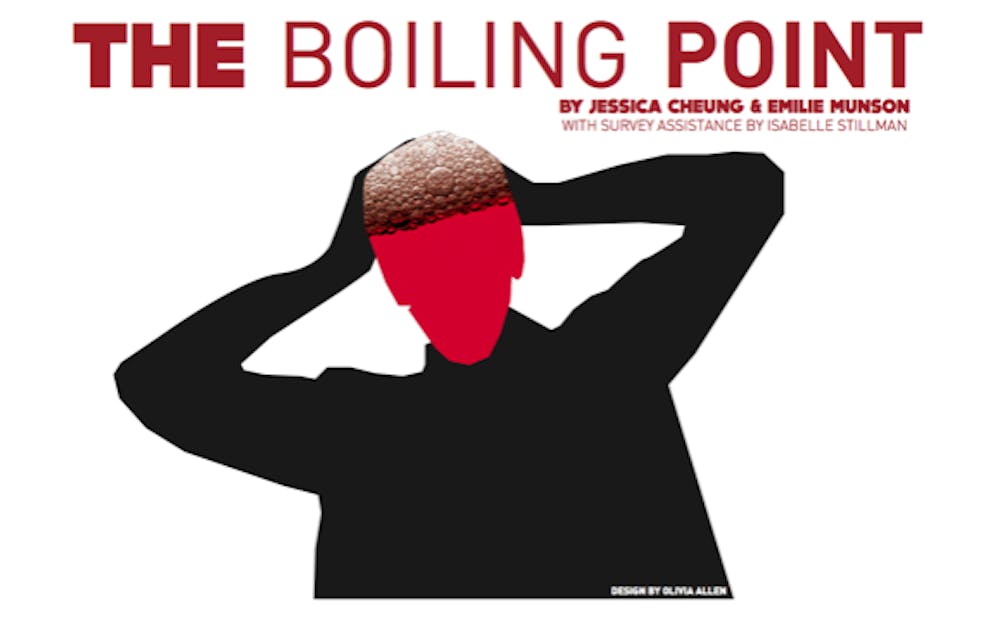Nail biting. Isolation. Tiredness. Irritability. Anxiety. These are all ways to tell when you’ve reached the boiling point. As most students have probably experienced, stress manifests in a variety of forms, intensities and lengths. According to the American Psychological Association, “stress can be a reaction to a short-lived situation, such as being stuck in traffic. Or it can last a long time if you’re dealing with relationship problems, a spouse’s death or other serious situations.” In Middlebury terms, this means that stress can be a finals week fling or a four-year romance.

This week The Campus explored how students at the College define their relationship with stress. We surveyed 112 students about where their stressors come from, how their stress levels at the College compare to past stresses and how they deal with their stress.
According to our survey, 30 percent of students reported high stress — identified their stress as 7, 8, 9 or 10 on a one to ten scale — from daily academics at the College. This number spiked to 70 percent during midterms and a whopping 80 percent during finals. The leading causes of stress outside of academics were extracurricular activities and athletics.
These findings paralleled the observations of Counseling Director of Parton Health Center Ximena Mejia.
“The leading causes of stress at Middlebury are anxiety regarding high academic expectations, over commitment of extracurricular activities, and unrealistic social life expectations,” said Mejia. “Students at Middlebury have high expectations of themselves, which isn’t all bad, but can become problematic when concentrated on multiple demands at the end of a semester.”
Counseling Intern Mark Nash, who led an eight-week workshop this year on “Mindfulness, Stress Relief and the Art of Being Enough,” adds that student stress often stems from expectations that they set for themselves in high school.
“Students worked very hard to get here, and now that they’ve arrived, they feel like the bar is set even higher, and they stress about never really being able to reach that bar,” said Nash. “I’m not sure there’s anything about the atmosphere here, as much as the school’s reputation. When you’re attending what is often referred to as one of the best schools in the country, you can feel a lot of pressure to live up to that standard.”
Often students deal with their high stress levels in unhealthy ways including sleep deprivation, missing meals, increased caffeine intake and increased substance intake, including alcohol, prescription medications and illegal drugs. Our survey confirmed that drinking alcohol was the eighth most popular way to deal with stress and drug use was the twelfth most popular.
The most popular stress busters at the College proved to be much healthier options. The top three ways for students to deal with stress were exercising, sleeping, and socializing. These methods of stress busting were recommended by Mejia in addition to stress management techniques such as mindfulness, meditation and yoga.
Many students also combat their stress by talking about it with their friends and family. Talking to family was the fifth most popular way to deal with stress at the College and sixty-one percent of students reported that they choose to express their stress rather than hide it. Despite this apparent openness about stress, 62 percent of students believe they are less stressed than their peers when there are relatively uniform levels of high stress among students at the College.
Put these numbers in context and we see stress at the College as part of a larger trend. According to a 2011 University of California Los Angeles survey, more than 200,000 first-year students across 300 four-year colleges say their overall emotional health is “below average.” At the same time, 52 percent of students say their emotional health was above average. In 1985, that number was 64 percent. As emotional health among college students decline nationally, Middlebury is not immune to the trend.
“Middlebury student stress is similar to stress at other student stress at other similar institutions,” Mejia said. However, 95 percent of surveyed students say they are more stressed out compared to students at other institutions.
While stress is part and parcel of a rigorous academic experience, it’s never really clear when we’ve pushed past a breaking point. Students for looking resources to deal with their stress should check out Parton Health Center’s weekly yoga for stress classes, guided meditation during finals week and online mindfulness resources. Nash also recommends that stressed students speak with a counselor because they will not have to worry about burdening them with their problems unlike family or friends.
“Another great way to deal with stress is to talk about it with someone who is there for the sole purpose of listening,” said Nash. “When you talk to a counselor, you don’t need to worry about taking care of them. And while a counselor rarely gives advice or offers solutions, they can offer new perspectives that can help you find your own answers and strategies.”
For more information about resources to deal with your stress, visit go/parton.
The Boiling Point

Comments


